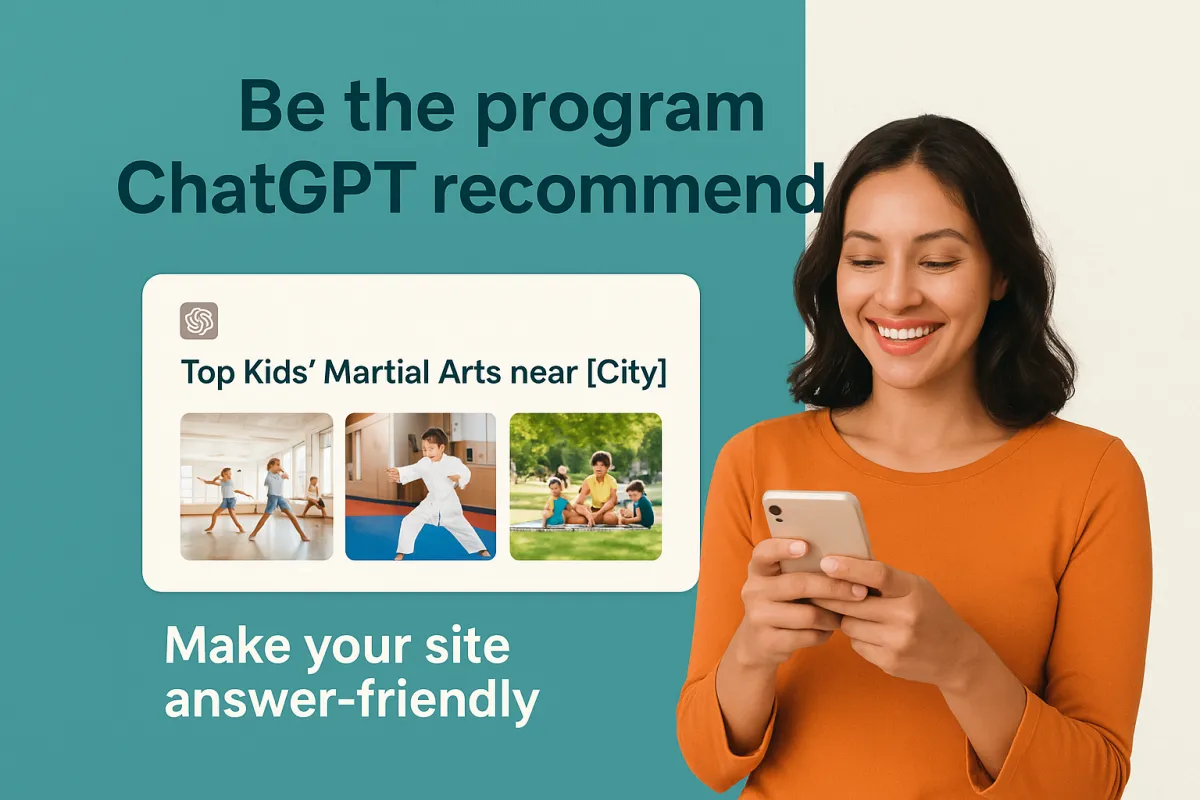
Why ChatGPT visibility (not just Google rankings) matters for activity programs in 2025
If you run a martial-arts school, dance studio, summer camp, tumbling or cheer program, your marketing used to have one top priority: rank in Google. In 2025, that’s only half the story. ChatGPT and other AI-driven search engines now synthesize and recommend local businesses directly inside chat answers and appearing there can drive bookings, calls, and trust just like (or even more than) traditional search results.
What “appearing in ChatGPT” actually means for local programs
When someone asks ChatGPT “best kids’ martial arts class near me” or “fun summer camps in [city],” the model returns a short answer that often includes a small list of recommended providers and links. Those answers are synthesized from web sources and indexed data, and they act as a new kind of “referral engine” shorter attention spans, fewer clicks, and fast decisions. That means being the source ChatGPT cites (or the page it summarizes) can put your program front and center for parents and guardians.
Why traditional SEO alone isn’t enough
Traditional SEO optimizes pages for human search results, ranking signals, and link authority. Generative engines (ChatGPT, Google’s AI overviews, Perplexity, etc.) prioritize concise, authoritative answers that are easy for models to summarize. This has given rise to Generative Engine Optimization (GEO) an approach focused on making your content machine-readable, answerable, and trustworthy for LLMs. GEO is not an optional extra; it’s an evolution of SEO for AI-first search.
GEO basics for activity-based programs (what to focus on)
For studios and programs, GEO means designing your site and public listings so AI can quickly understand what you do, where you do it, and why parents should choose you.
Practical steps:
Clear site structure + service pages — Create dedicated pages for each program (e.g., “Kids Martial Arts — Ages 5–7”, “Tumbling Level 1”, “Summer Day Camp: Week 1”). Short, focused pages are easier for models to extract and summarize.
Parent-friendly FAQs (on-page Q&As) — Add explicit questions and short answers like “Do you offer trial classes?”, “What should kids bring?” Use FAQ Page schema (JSON-LD) so AI can detect Q&A pairs.
Local keywords + hyperlocal content — Include neighborhood names, nearby landmarks, and local phrases parents use (“after school tumbling in [neighborhood]”) so AI can match intent.
Keep schedules and pricing current — ChatGPT prefers up to date info. Stale or inconsistent details lower the chance you’ll be cited.
Structured data / schema markup — Add schema for Organization, Local Business, Event (for camps), Course, and aggregate ratings. Structured data helps generative engines pull crisp facts.
Showcase testimonials & reviews — Short, specific parent testimonials (ideally on pages for each program) increase credibility and provide language models concrete phrasing to surface.
Optimize listings — Keep Google Business Profile, Yelp, and major directories accurate. Generative engines pull from these sources when compiling local answers.
Make content scannable — Short headers, bullet lists of what’s included in a class, program durations, age ranges and price ranges easy to summarize into a one paragraph answer.
Host authoritative resources — Publish how to guides or short videos (e.g., “3 ways to spot a good beginner tumbling class”) that demonstrate domain expertise. Models favor high quality informational content.
Examples from other industries
Healthcare, home services, and local retail are already adapting GEO: clinics and contractors format FAQ pages, add structured service pages and keep data consistent across directories and many report increased discovery through AI answer engines. The same tactics transfer directly to activity providers: clarity + structured facts = higher chance of being recommended.
Quick GEO checklist for activity programs
Dedicated program pages (age + level + outcomes)
FAQ section per page (FAQ Page schema)
Up to date schedule & session dates (visible on site)
Local keywords and neighborhood pages
Testimonials on each offering page
Structured data: Local Business, Course, Event, Review JSON-LD
Consistent NAP across Google Business Profile + directories
Short explainer videos + transcripts
Monitor mentions on high-authority local sites and blogs
Tools, documentation & next steps
Start with OpenAI’s ChatGPT Search docs and update your knowledge of how ChatGPT uses web sources. Use GEO resources and local SEO guides to implement structured data and FAQ schema. There are new GEO dashboards and tools that help you track which pages AI engines are pulling from consider adding one to your toolkit.
Final thought
In 2025, being discoverable in ChatGPT is as strategically important as ranking on Google. For program owners, the path is pragmatic: make your website answer-friendly, maintain accurate local data, and give AI engines short, high quality facts to pull. That’s how you move from “maybe listed” to “recommended.”
